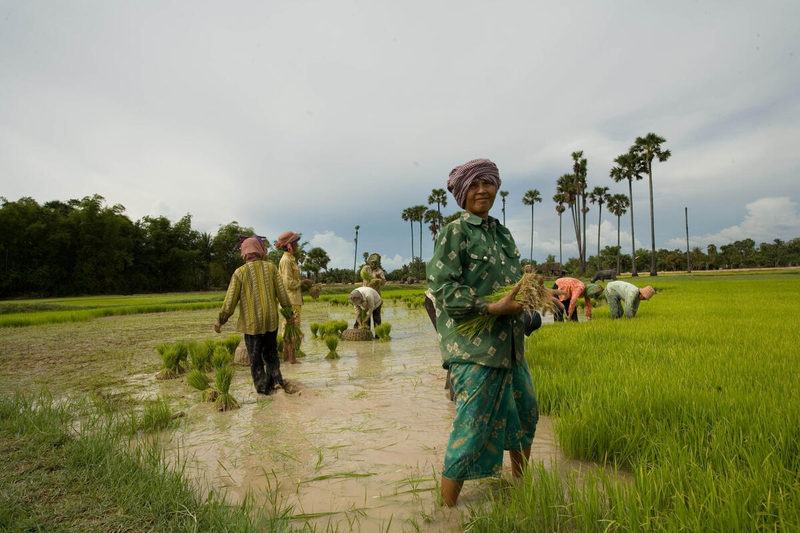New investment to boost climate-resilient agriculture in Cambodia

A community of farmers harvesting bundles of rice seedlings to be transplanted in other paddies within the province of Siem Reap.
©FAO/A.K. Kimoto
The Green Climate Fund (GCF) has approved a major new programme to strengthen climate resilience in Cambodia’s agriculture sector. Climate Adaptive Irrigation and Sustainable Agriculture for Resilience (CAISAR), valued at USD 240 million, was endorsed by the GCF Board this week.
This marks a significant milestone in Cambodia’s efforts to scale up climate-adaptive infrastructure in the face of intensifying floods and weather extremes.
More than 560 000 people are expected to benefit directly from improved irrigation across approximately 32 000 hectares, while more than one million people are anticipated to gain indirect protection from flooding.
CAISAR is designed to rehabilitate and modernize six major irrigation schemes in Cambodia, while introducing controlled water management systems and nature-based solutions – such as improved drainage and rural road infrastructure.
CAISAR is jointly financed by the International Fund for Agricultural Development (IFAD), which is providing a USD 45 million loan, the Asian Infrastructure Investment Bank (AIIB), contributing USD 100 million, the GCF, with USD 40 million in loan financing and USD 40 million in grants, and the Royal Government of Cambodia, contributing USD 15 million in domestic co-financing.
“This is a flagship climate investment for IFAD in Southeast Asia, developed in collaboration with GCF, AIIB, FAO and the Royal Government of Cambodia,” said Frew Behabtu, IFAD's Country Director for Cambodia. “CAISAR will not only establish new models for climate-resilient irrigation and adaptive agriculture in the region but also strengthen rural livelihoods.”
The programme was formulated under the leadership of IFAD, in close collaboration with AIIB – a major co-financier – and national partners, with technical support from FAO Investment Centre. As one of IFAD’s first collaborations with AIIB, the programme exemplifies a multi-partner effort, in which each institution contributed distinct expertise, from financing and technical design to policy alignment and national leadership.
“Our analysis shows that this kind of innovative financing – involving multiple financial partners – can assure higher returns, de-risk climate investments, and promote more concessional loans to help countries address climate-related challenges,” said Dennis Escudero, Agricultural Economist at the FAO Investment Centre and the Economist on the project design team.
FAO Investment Centre played a central role throughout all stages of programme development and presentation, providing technical assistance in the design of irrigation schemes, preparation of initial environmental and social safeguard plans, and the financial structuring of the programme. The Centre also led the economic and financial analysis, supported the establishment of a tariff system to ensure long-term sustainability of irrigation and drainage systems, and collaborated with FAO’s Agrifood Economics Division to conduct greenhouse gas (GHG) emissions accounting.
Programme investments aim to enhance the resilience of rice-based systems, diversify agricultural livelihoods through vegetable production and aquaculture, and strengthen flood protection for vulnerable rural communities. The programme also includes targeted investments to strengthen climate governance and institutional capacity at national and subnational levels.
“CAISAR is about delivering lasting improvements in irrigation and drainage systems that help farmers manage climate risks and improve productivity,” said Rajesh Yadav, Senior Investment Officer and Project Team Leader for CAISAR at AIIB. “Through close collaboration with IFAD and GCF, this investment reflects our shared commitment to sustainable, climate-resilient agriculture in Cambodia.”
With the approval of CAISAR, Cambodia takes a step forward in expanding climate-resilient irrigation and transforming its agriculture sector. By modernizing infrastructure, supporting diversified livelihoods, and strengthening institutional capacity, the project lays the groundwork for long-term agricultural adaptation in one of Asia’s most climate-exposed countries.
